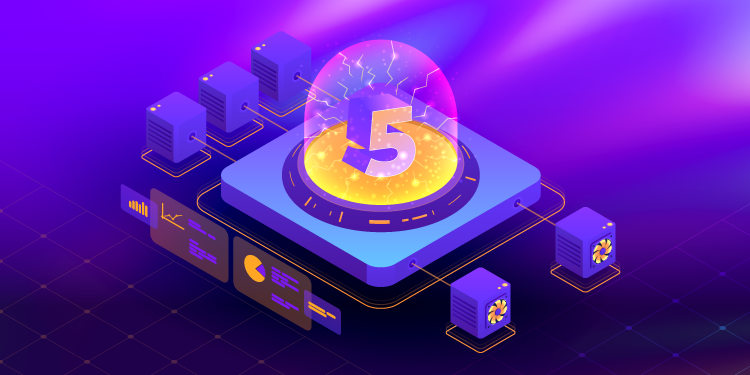Last quarter, blockchain projects raised a record $4.4 billion, and Statista is calling 2021 the “year of the cryptocurrency.” All this frenzied capital is built on one premise: That decentralized networks are advantageous in a number of ways, including trustlessness, transparency, and greater security.
Let’s explore how 5 blockchain projects are using the benefits of decentralization for real value-add, across NFTs, decentralized finance, gaming, and charity.
1. Polygon – the Internet of Blockchains
Polygon bills itself as Ethereum’s Internet of Blockchains. Everyone in blockchain knows Ethereum – it’s the platform of choice for building decentralized applications. But that doesn’t mean it’s perfect, and Ethereum transaction speed and cost leave much to be desired.
Ethereum-compatible blockchains can mitigate those problems, and Polygon makes it effortless. Hundreds of decentralized applications have scaled their operations with Polygon, including DeFi projects like Easyfi and NFT projects like Neon District.
In fact, Polygon makes it so easy to build scalable DApps that a 13-year-old student built a cryptocurrency money managing ecosystem, PolyGaj, that’s now managing millions of dollars.
Polygon has even launched a unit to grow blockchain gaming and NFTs, called Polygon Studios. With the help of investors like Mark Cuban, Polygon has built the Polygon NFT Studio that makes it easy to launch custom NFT models and marketplaces.
2. Next Earth – a decentralized virtual world
Next Earth is a virtual world owned and governed by its users. It’s a place where you can buy and trade virtual land from a one-to-one digital replica of Earth, while contributing to environmental charities.
The long-term vision is to enable users to build anything from tiny scenes to sprawling cities; host social gatherings or hold business meetings; or even go on adventures with friends.
The best part? Everything in Next Earth exists on a blockchain so it’s secure, transparent, and easily verifiable by all users. This means that you don’t have to worry about your land ownership being taken or modified without your permission.
3. Aave – a DeFi lender
Aave is a decentralized lending platform that lets you earn interest on deposits and borrowing assets.
Their goal is to provide an alternative to traditional banks, with lower fees and greater control over your money. Aave’s liquidity pool is worth over $20 billion, as of writing.
Aave’s Ethereum-based smart contracts replace the need for a middleman in asset-trading, futures contracts, and savings accounts.
Given that the world’s debt burden is close to $300 trillion, the potential in this space is practically infinite.
4. Algorand – a faster and cheaper Ethereum
Algorand is an Ethereum 2.0 platform that leverages the latest research in proof-of-stake, plasma, and sharding to provide faster transactions with lower fees than existing platforms like Ethereum.
Algorand is being used in a diverse range of financial applications, including for NFTs, stablecoins, securities, payment infrastructure, financial protocols, and more.
They’ve developed a consensus protocol that allows for secure yet decentralized blockchain applications at much larger scales – which is crucial for mass adoption of blockchain, making Algorand a key project to keep an eye on.
As of writing, Algorand is already handling over 1,000 transactions per second in real-world applications, with a transaction time to finality of just a few seconds.
5. SolarCoin – mint one token for every solar MWh
There’s a huge elephant in the room when it comes to blockchain: Energy inefficiency. Blockchains are notoriously energy-intensive, with Bitcoin consuming over half a percent of global energy production, roughly equal to the annual energy use of countries like Sweden or Malaysia.
SolarCoin is a cryptocurrency designed to reward people who install solar panels and help remove the barriers of entry for solar energy adoption. By issuing their own cryptocurrency, they hope to incentivize individuals who take small steps toward lowering our reliance on fossil fuels while providing incentives for all parties in the renewable energy supply chain: developers, investors, manufacturers, installers, and distributors alike.
By tracking the amount of electricity generated by each individual solar panel, they hope to create the most accurate accounting system of any existing energy project out there.
In conclusion, blockchain has rapidly evolved from a niche technology to a mainstream phenomenon. It has been applied to a diverse range of industries, and 2021 is seeing a number of particularly hot use-cases in NFTs, virtual worlds, and DeFi.





